Rome Cluster Web Browser Concept
In this article I would like to present my idea of a new kind of web browsers to your court. I called it as many as Rome and the main feature of this browser is its ability to create clustered work areas and increased efficiency in working with links.
Let's take it in order.
A bit of history. The very idea of such a concept came to me when I surfed the Internet in search of useful and reliable information about startups, what it is, what they eat and whether it is necessary at all. This boisterous activity led to a huge number of open links in the browser, into the flesh before opening and filling out another additional window, as a result, the computer began to slow down, and after launching the torrent to download the right book, it was generally suspended (the machine is weak, but I am sure that I am not the only one who uses it and set such tasks). This all led me to a number of thoughts about the essence of modern browsers and the convenience and efficiency of their use, it was these reflections that led me to develop a browser concept that can provide advanced user capabilities and not be buggy with an increase in the number of open links.
Tasks that I set for the future browser:
')
1) Multifunctionality. The essence of the task lies in the fact that no matter what important information we were looking for with us, most likely [100% in my case], one or even two messengers [vk, fb, + mail, etc.] are launched and every time a message comes in, it is necessary to get out of the site where you are sitting and look for the link where the message arrived, taking into account several open windows - a rather inconvenient situation. That is why the browser should be able to collect a cluster from the windows where all the necessary sites would be collected.
2) It should be convenient to use a large number of links without overloading the computer. Classic browsers have certainly useful, but as I begin to think, not in all cases necessary. The reason lies in the fact that opening a link, the browser starts to load it automatically, wasting computer resources on what you are not currently using.
Implementation ideas:
1) Behind multifunctionality is the ability to form a cluster. What do I mean by cluster? In this case, a cluster is a certain amount of links (no more than 4), which forms the user's working area within the web browser window. Figure 1 shows a cluster browser window divided into two workspaces. The size of areas may vary depending on the movements of the slider placed on the axis.
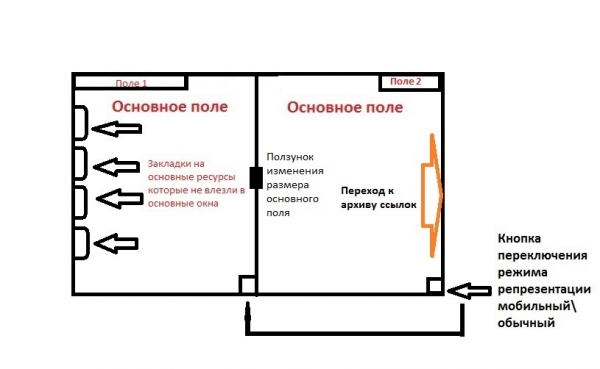
Picture 1.
The workspace can accept such configurations depending on the position of the slider:
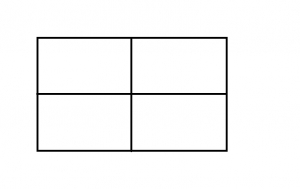
fig.2
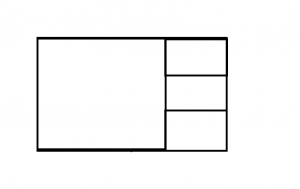
fig.3
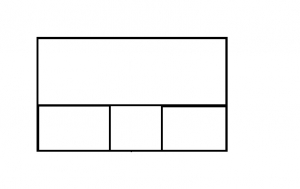
fig.4
When I showed this idea to my friends, acquaintances, they had a rather logical question: “Why?”. The largest window is the main working area of the user, small windows are auxiliary zones where only social media messengers and mail monitoring are placed (you can shove the rss feed there). All this will allow a minimum of distraction on the outside, to do their work.
2) I consider the need to relieve the computer from bad work as extremely important. The idea is to delimit the zone of references that you need to read right now and those that you read a little later. The first ones open as in the classic browser browser, the second ones are sent to the “Links archive” (Figure 1, the button in the right corner of the screen). Such a system will allow to use only those links that the user intends to use right now and after using or close or send to the archive, the system simultaneously loads only a few links and one cluster, instead of dozens of links, agree - this is quite economical.
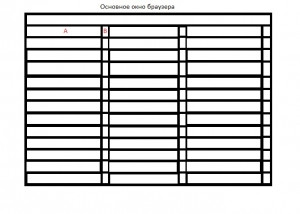
Appearance of the "Archive of links." This situation also makes it possible to roughly navigate what link is open, in contrast to the small icons of the classic browser.
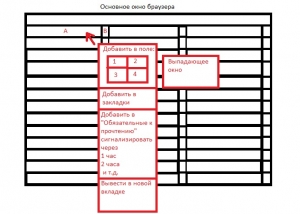
Drop-down menu that allows the output of an archive link to a cluster or a separate window (with the subsequent possibility of forming another cluster).
I am well aware that the idea is rather crude, but I am interested in your comments.
Let's take it in order.
A bit of history. The very idea of such a concept came to me when I surfed the Internet in search of useful and reliable information about startups, what it is, what they eat and whether it is necessary at all. This boisterous activity led to a huge number of open links in the browser, into the flesh before opening and filling out another additional window, as a result, the computer began to slow down, and after launching the torrent to download the right book, it was generally suspended (the machine is weak, but I am sure that I am not the only one who uses it and set such tasks). This all led me to a number of thoughts about the essence of modern browsers and the convenience and efficiency of their use, it was these reflections that led me to develop a browser concept that can provide advanced user capabilities and not be buggy with an increase in the number of open links.
Tasks that I set for the future browser:
')
1) Multifunctionality. The essence of the task lies in the fact that no matter what important information we were looking for with us, most likely [100% in my case], one or even two messengers [vk, fb, + mail, etc.] are launched and every time a message comes in, it is necessary to get out of the site where you are sitting and look for the link where the message arrived, taking into account several open windows - a rather inconvenient situation. That is why the browser should be able to collect a cluster from the windows where all the necessary sites would be collected.
2) It should be convenient to use a large number of links without overloading the computer. Classic browsers have certainly useful, but as I begin to think, not in all cases necessary. The reason lies in the fact that opening a link, the browser starts to load it automatically, wasting computer resources on what you are not currently using.
Implementation ideas:
1) Behind multifunctionality is the ability to form a cluster. What do I mean by cluster? In this case, a cluster is a certain amount of links (no more than 4), which forms the user's working area within the web browser window. Figure 1 shows a cluster browser window divided into two workspaces. The size of areas may vary depending on the movements of the slider placed on the axis.

Picture 1.
The workspace can accept such configurations depending on the position of the slider:

fig.2

fig.3

fig.4
When I showed this idea to my friends, acquaintances, they had a rather logical question: “Why?”. The largest window is the main working area of the user, small windows are auxiliary zones where only social media messengers and mail monitoring are placed (you can shove the rss feed there). All this will allow a minimum of distraction on the outside, to do their work.
2) I consider the need to relieve the computer from bad work as extremely important. The idea is to delimit the zone of references that you need to read right now and those that you read a little later. The first ones open as in the classic browser browser, the second ones are sent to the “Links archive” (Figure 1, the button in the right corner of the screen). Such a system will allow to use only those links that the user intends to use right now and after using or close or send to the archive, the system simultaneously loads only a few links and one cluster, instead of dozens of links, agree - this is quite economical.

Appearance of the "Archive of links." This situation also makes it possible to roughly navigate what link is open, in contrast to the small icons of the classic browser.

Drop-down menu that allows the output of an archive link to a cluster or a separate window (with the subsequent possibility of forming another cluster).
I am well aware that the idea is rather crude, but I am interested in your comments.
Source: https://habr.com/ru/post/187472/
All Articles